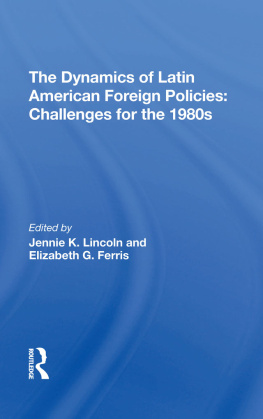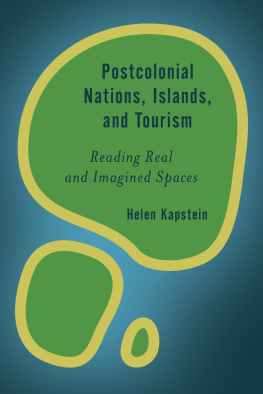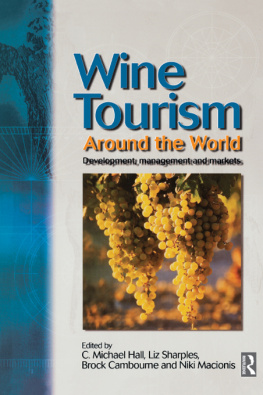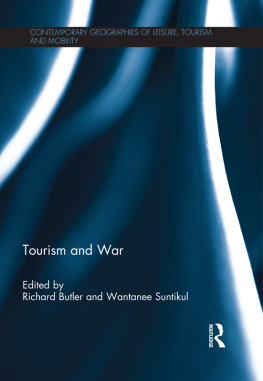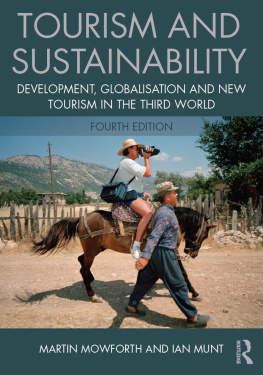Stanford University Press
Stanford, California
2011 by the Board of Trustees of the Leland Stanford Junior University. All rights reserved.
No part of this book may be reproduced or transmitted in any form or by any means, electronic or mechanical, including photocopying and recording, or in any information storage or retrieval system without the prior written permission of Stanford University Press.
Printed in the United States of America on acid-free, archival-quality paper
Library of Congress Cataloging-in-Publication Data
Babb, Florence E.
The tourism encounter : fashioning Latin American nations and histories / Florence E. Babb.
p. cm.
Includes bibliographical references and index.
ISBN 978-0-8047-7155-9 (cloth : alk. paper)ISBN 978-0-8047-7156-6 (pbk. : alk. paper)
1. Culture and tourismLatin America. 2. TourismPolitical aspectsLatin America. 3. Collective memoryLatin America. 4. Latin AmericaPolitics and government1980I. Title.
G155.L29B34 2010
338.4'7918dc22
2010013020
Typeset by Bruce Lundquist in 10/14 Minion
eISBN: 9780804775601
Preface
Anthropologists notoriously worry about being mistaken for tourists, and this is particularly so for those who study tourism, conducting research in places where tourists gather. While carrying out the research for this book on tourism in contexts of change in Latin America, I was sometimes happy to blend in with other travelers, to see as they see and interact with them freed of the trappings of my trade. Nonetheless, conversations soon turned to what we do back home and our travel plansor to what I was recording in my notebookand I quickly revealed the ulterior motives for my repeated sojourns to Cuba, Mexico, Nicaragua, and Peru. Moreover, my internal checks had me constantly monitoring myself to be certain that I was working hard enough on a research topic that involved leisure and travel even if it also frequently involved tourists (like anthropologists) desires for knowledge of culture, heritage, and politics in foreign lands.
To be sure, I was just as interested in the other side of the tourism encounter, the experience of those local populations that were toured in postrevolutionary and postconflict societies in Latin America and the Caribbean. In that regard, it was easier to feel in my element as an ethnographer and in touch with my subject position as a U.S. researcher as I considered the active ways in which those of culturally different backgrounds sought opportunities to make good on tourism. With both tourists and toured as the focus of my inquiry in fairly equal measure, the methods of cultural anthropology were indeed useful to exploring the terrains on which all of these actors came together.
Like some others who have come to appreciate the importance of tourism for understanding the co-construction of cultural identities, histories, and nations, I would say that tourism found me as much as I found tourism as a research subject. As I describe in the Introduction, I had already spent time and carried out research in all four nations before I came to view tourism as a particularly useful prism for considering questions that emerge in places marked in recent times by conflict or revolution. At first I noted the erasures of past histories that might be unsettling to tourists, but then laterand more significantly to the argument advanced in this bookI discovered more subtle ways in which these nations, often despite ambivalence, look to tourism to continue processes of social transformation begun during earlier times. This often presents surprising contradictions, as nations that have embraced revolution now adopt practices more common to neoliberal capitalist societies. National tourism industries may account for the turn toward marketing their peoples and cultures in terms of broad efforts to rescue economies. Or industries and nations may reference deep histories and cultural heritage in order to salvage a claim to greater valor in tourism development. In regions such as Chiapas in southern Mexico, a recent history of rebellion may be invoked to capture both economic and political support through solidarity tourism.
The experiences of tourists and toured have been captured in literature by such well-known writers as Graham Greene, a British novelist whose work was inspired by his travel to places like Mexico (The Power and the Glory, 1940) and Cuba (Our Man in Havana, 1958) and whose left-leaning sentiments were informed by politics in these remote destinations. Fewer writers have explored the experience of being toured, but West Indian writer Jamaica Kincaid, in A Small Place (1988), offered a quintessential and searing critique of the tourism encounter from the vantage point of the small Caribbean island where she grew up. My use of textual material more often calls on travel writing, guidebooks, and advertising, but the literary turn toward travel in fiction and memoir signals how profoundly global tourism has marked contemporary lives.
In an anthology of ethnographic work in contexts of dramatic change, Kay Warren writes that anthropology has increasingly become the study of instability and fragmentation, of systems caught in contradictory currents of change (2002:380). Of course, we are drawn to examining instability and change in large measure because this is the state of the world today. I share with contributors to that volume (Greenhouse et al. 2002) a commitment to an engaged anthropology that explores historical processes in order to shed light on transitional societies, transnational currents, and efforts to support a more equitable balance of power across nations. Part of this critical exploration is to question representations of the Other in periods of abrupt political change, including tourism's quest for the exotic and different, and the occasional (often strategic) complicity of the toured in marketing their cultural identity and authenticity. In the work presented here, I propose that even if regions and nations ambivalent tendency to trade on nostalgiawhether for revolution or cultural heritageis a product of neoliberal capitalism, it is often carefully calibrated as a way to interpret the past and anticipate the future, to stabilize governance and save economies. Thus, we need to view tourism as far more than a selling out to global interests and to understand it as fundamentally linked, for better or worse, to the refashioning of histories and nations.
In much of my past work, feminist analysis of gender relations in Latin America has been central. It is no less important in this work, though I do not shape my argument entirely around the connection between tourism and gender. Nevertheless, I keep gender and other forms of social difference, including race, class, and national identity, at play throughout. One of the three main sections of the book examines the particular gendered consequences of tourism for local populations, including those who are marked by their racial difference, and how women in particular respond to both the challenges and opportunities presented by tourism. While some women in tourism destinations enter the world of sex and romance tourism, others are centrally involved in forms of cultural, eco-, and mainstream tourism. There is no single or unilinear outcome of tourism development for the women and men discussed here, whether they are tourists or toured.



